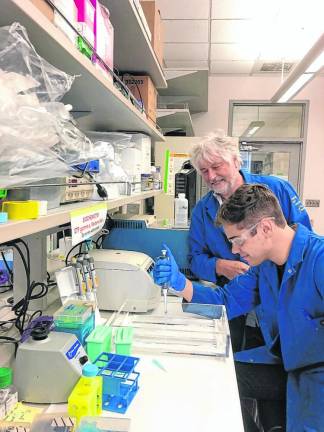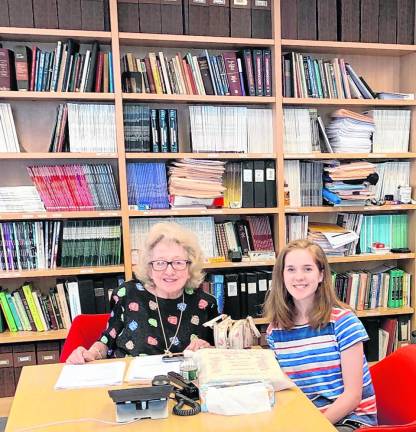IES Brain Research Foundation turns 20
SPARTA. The nonprofit will resume awarding summer fellowships in neuroscience this year.


The Irene & Eric Simon (IES) Brain Research Foundation is celebrating its 20th anniversary and plans to resume awarding its summer fellowship in neuroscience.
2019 was the last year that the foundation awarded the fellowship because of the COVID-19 pandemic.
“It’s the 20th anniversary so it’s an appropriate time to come back,” said Faye Simon Harac, president and founder of the foundation.
In the past, the foundation received between 35 and 80 applications for the fellowship, which is awarded to motivated undergraduate, first-year graduate and medical students. They are mentored by a neuroscientist and head of a top-notch lab for eight weeks during the summer.
In 2005, two fellowships were awarded; by the 10th anniversary, there were 10 fellowships. As of 2019, the foundation had awarded 110 fellowships.
Honoring her parents
Harac, a Sparta resident, formed the foundation to honor her parents and to help further education and research in her father’s field.
Dr. Eric Simon, who died in 2020 at age 95, worked as a New York University researcher for more than 50 years. He coined the word endorphin and discovered opiate receptors in the brain.
“Although he focused on drug addiction on the brain, a lot of the research can be used on other brain diseases and disorders,” she explained.
The foundation is a nonprofit charity run by volunteers. It raises money from donors, sponsors and fundraisers.
Its annual Endorphin Golf Outing and Dinner will be June 3 at the Lake Mohawk Golf Club. All proceeds will benefit the foundation’s fellowship.
“As a volunteer-run nonprofit, it is stressful trying to get enough participants and donors at the fundraising event that supports the summer fellowship program in neuroscience as well as getting volunteers to help,” Harac said.
Lab experience
The idea of awarding fellowships came from the foundation’s scientific committee, which is made up of neuroscientists. Committee members read the applications and select the fellows.
The fellows work full-time for eight to 10 weeks. They receive $2,500.
The goal is for students to experience full-time work in a lab so they can decide if they want to do that as a career, Harac said.
“The majority of students went onto a Ph.D. or a M.D./Ph.D. in neuroscience. The students have to be really bright and motivated.”
Aurora Grutman, who was a fellow in the 2019 summer program, graduated summa cum laude from Yale with a bachelor’s degree in chemistry.
“As I walked to get my diploma, I was filled with immense gratitude for all the people who helped me get to that moment,” she said. “Of course, I thought of Eric Simon and the IES BRF who showed me such generosity during the summer of 2019.
“My time studying under Dr. (Mary Jeanne) Kreek at Rockefeller University was absolutely transformative - she taught me that addiction is a biological disease, not a moral failing. I became so interested in the field of addiction medicine that I continued research and worked in a clinical addiction lab throughout college.
“I will never forget the foundation dinner where I got to meet so many wonderful scientists. It was truly an honor and a privilege to be in the same room with such titans. I am now a second-year medical student at Johns Hopkins, and I am still building on the skills I gained that summer.”
Fellow Jacob Alderete said, “Glad to hear that the fellowship is once again is available for students! I know it was a great experience for me. I am doing well and now in my third year of medical school at UCLA. Best of luck to the future applicants and thank you for all the work you do. You are helping to foster the next generation of scientists.”
Alderete is planning a career in neurosurgery. “I’ve continued research on pain and addiction and am now investigating the pathways in the brain that are responsible for the rewarding and pain-killing aspects of opioids and how that differed with patients with chronic pain.”
Deadline is March 20
For the fellowship application, students must write about their science classes, why they want to do the fellowship and what neuroscientist they would select as a mentor. The students must contact a neuroscientist about being their mentor, who is not paid.
The application also lists the student’s year of school, their school and their grades.
Information and application forms are online at www.iesbrainresearch.org
Applications must be postmarked by March 20.
Selected students will be notified by April 30. Fellowships start between mid-May and June 1. At the end of the fellowship, students submit a two-page report describing their research and summer experience.
The foundation accepts donations via PayPal, credit card or check. For information, go to www.iesbrainresearch.org/donate
CORRECTION: The organization’s website was incorrect in an earlier version of this article. We regret the error.
My time studying under Dr. (Mary Jeanne) Kreek at Rockefeller University was absolutely transformative - she taught me that addiction is a biological disease, not a moral failing. I became so interested in the field of addiction medicine that I continued research and worked in a clinical addiction lab throughout college.” - Aurora Grutman, 2019 fellow, Irene & Eric Simon Brain Research Foundation